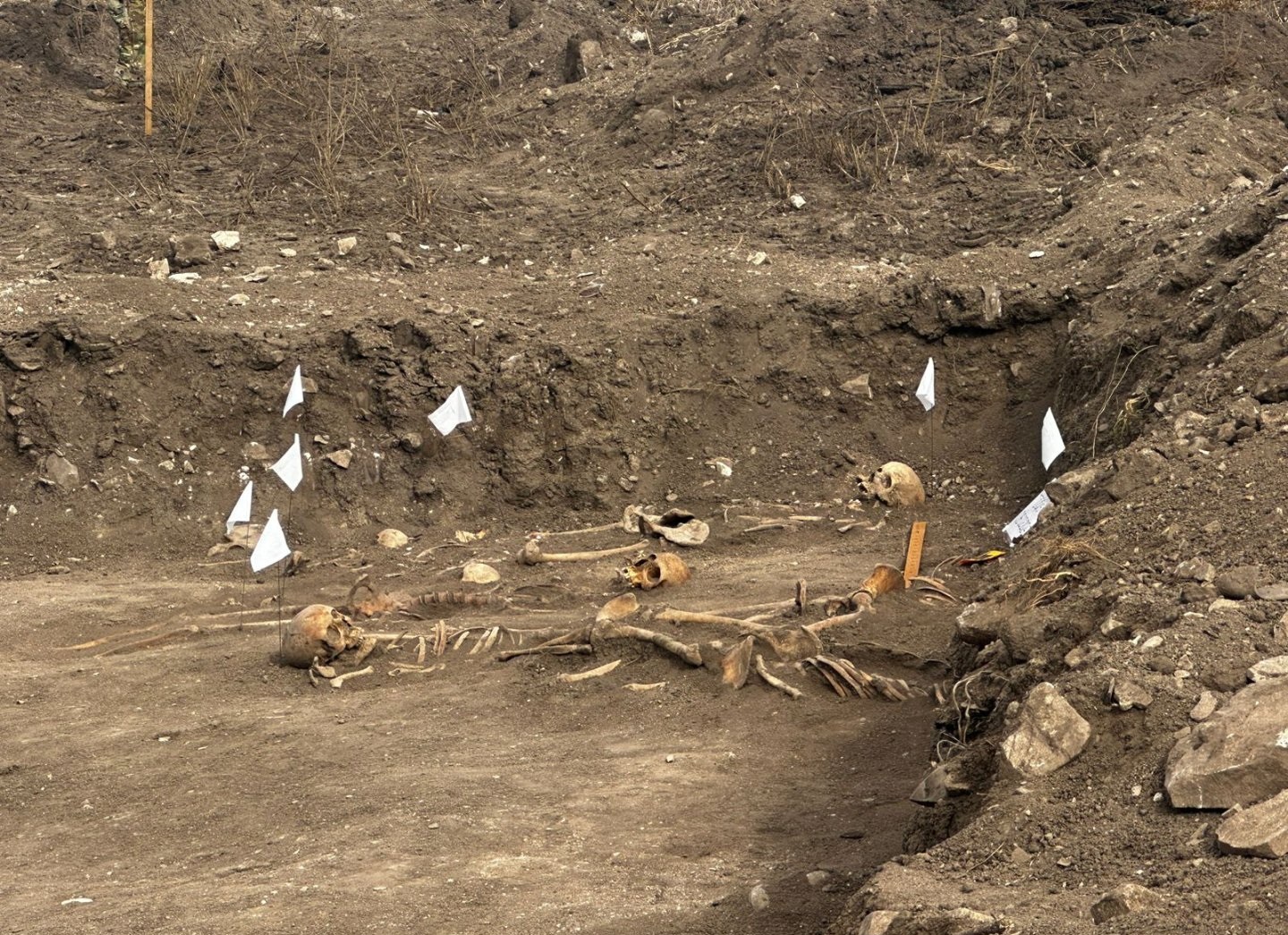Excavations near the Asgaran fortress in Khojaly, Karabakh region, revealed on Thursday a new mass grave believed to contain the remains of Azerbaijani victims from the 1992 Khojaly Genocide.
The Azerbaijan State Commission on Prisoners of War, Hostages and Missing Persons announced that the grave was located following the interrogation of Rashid Beglaryan, one of the Khojaly massacre culprits.
Zaur Ismayilov, a spokesperson for the Commission, detailed to the press how Beglaryan recounted the ambush and subsequent murder of civilians attempting to flee Khojaly towards Aghdam, near the Asgaran fortress, where the victims were later buried.
Initial analysis suggests the remains belong to at least eight individuals, presumably killed in the bloody events of 1992.
The excavations are ongoing, and there remains a possibility of finding more victims. The next steps involve transporting the unearthed remains to specialized laboratories for thorough identification processes, as confirmed by Ismayilov.
The massacre in Khojaly was part of a broader military campaign by Armenia to seize the Karabakh (Garabagh) region, an internationally recognized part of Azerbaijan.
The Armenia-Azerbaijan conflict emerged with anti-Azerbaijan sentiments in Armenia and later grew into armed intervention in Azerbaijan’s internationally recognized territories, including the Karabakh region.
A four-year bloody war between the two neighboring countries ended with a ceasefire in 1994 and saw Armenia occupying 20 percent of Azerbaijan’s sovereign territory. Over 30,000 Azerbaijanis were killed and one million were expelled from those lands in a brutal ethnic cleansing policy conducted by Armenia.
The Khojaly genocide is considered one of the bloodiest massacres committed by Armenia against ethnic Azerbaijanis. Late night on February 25, Armenia’s forces, backed by the Infantry Guard Regiment No. 366 from a then-collapsed Soviet army, attacked Khojaly. During the attack, the Armenian armed forces killed 613 ethnic Azerbaijanis, including 106 women, 63 children, and 70 elderly people; and took another 1,275 as hostages. Another 150 Azerbaijani nationals went missing, and their fates remain unknown to this day. Those suffering major injuries totaled 487, including 76 children.
Azerbaijan liberated the occupied territories as a result of a 44-day war with Armenia in 2020. On September 27, 2020, the longstanding conflict reignited when Armenia’s forces, stationed illegally in occupied Azerbaijani lands, attacked military positions and civilian settlements of Azerbaijan. In a 44-day counterattack, Azerbaijani forces liberated more than 300 settlements, including the cities of Jabrayil, Fuzuli, Zangilan, Gubadli, and Shusha, from Armenian occupation. The war concluded on November 10, 2020, with a tripartite statement signed by Armenia, Azerbaijan, and Russia. Under this agreement, Armenia returned the occupied Aghdam, Kalbajar, and Lachin districts to Azerbaijan.
Certain parts of Khojaly and Khojavand districts, as well as the city of Khankendi remained within the temporary monitoring zone of the Russian peacekeeping mission deployed in certain parts of the Karabakh region after the 2020 war.
Despite the legally binding demands on the withdrawal of the Armenian forces from the Karabakh region of Azerbaijan, the largest portion of the troops was stationed in Khankendi along with the other settlements, including Khojaly, Aghdara, Khojavand, and Asgaran. The peacekeepers failed to enforce the withdrawal despite their relevant obligations.
Since 2020, the Armenian army formations committed dozens of provocations, causing loss of life on the Azerbaijani side.
Azerbaijan Armed Forces launched on September 19, 2023, one-day local anti-terrorist measures to neutralize illegal Armenian armed formations and their military infrastructure in the Karabakh region. On September 20, the illegal separatist regime requested through the Russian peacekeeping command to cease the local anti-terror activities by agreeing to withdraw and complete disarmament of the Armenian armed formations.
Multiple mass and individual graves of Azerbaijanis in the liberated territories of Azerbaijan have been discovered post-war, including in Khojavand, Kalbajar, Aghdam, and Fuzuli regions, as well as around the city of Shusha.
Since 2020, at least 500 human remains have been unearthed in such graves in the villages of Bashlibel in Kalbajar, Edilli in Khojavand, Farrukh in Khojaly, Sarijali in Aghdam, Seyidahmadli in Fuzuli region, as well as in the vicinity of the Shusha prison and other settlements.
According to data compiled by the Azerbaijani government, 3,890 Azerbaijani citizens, including 71 children, 267 women, and 326 older adults, went missing during the First Karabakh War from 1991 to 1994. Baku has been demanding that Armenia assist in investigating the fate of those people, a request that remains unfulfilled.







 Armenian sappers commenced on Monday mine-clearance operations in the territories adjacent to the Saint Mary Church in village of Voskepar (Armenia...
Armenian sappers commenced on Monday mine-clearance operations in the territories adjacent to the Saint Mary Church in village of Voskepar (Armenia...
 Iran and Pakistan have signed eight cooperation documents in various fields, and agreed to strengthen ties to fight terrorism in the region.
Iran and Pakistan have signed eight cooperation documents in various fields, and agreed to strengthen ties to fight terrorism in the region.
 President Aliyev emphasized the critical role of the North-South Transport Corridor in fostering transport cooperation between Azerbaijan and Russi...
President Aliyev emphasized the critical role of the North-South Transport Corridor in fostering transport cooperation between Azerbaijan and Russi...



